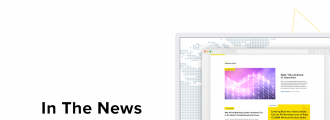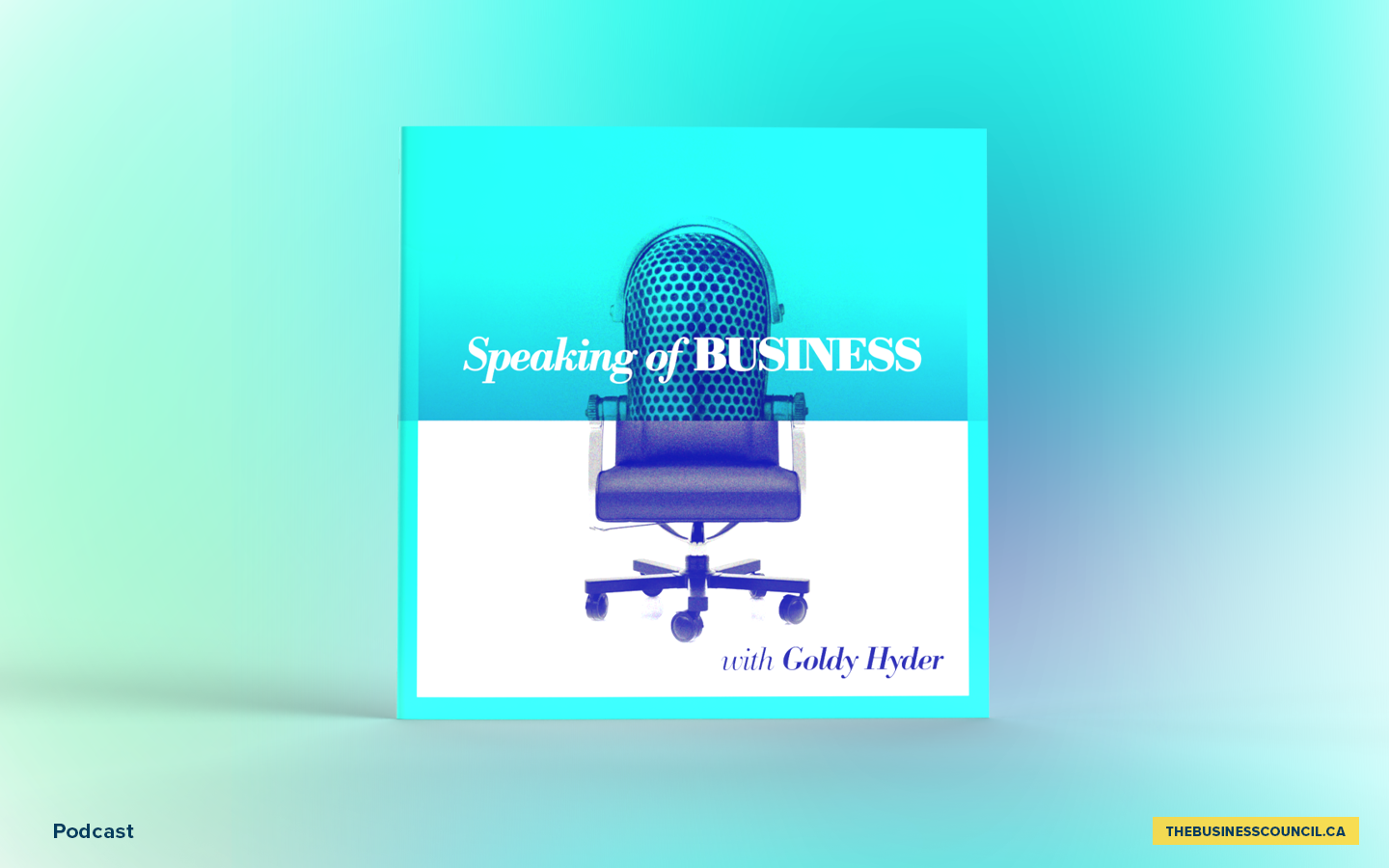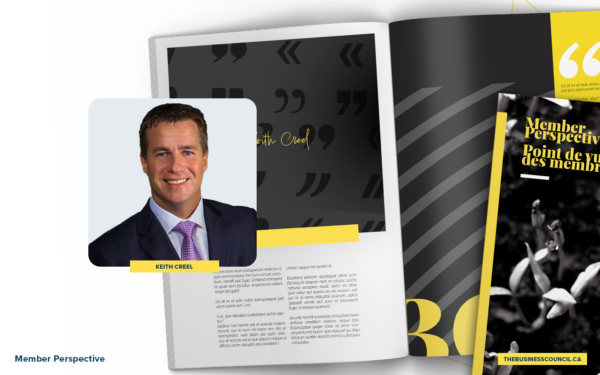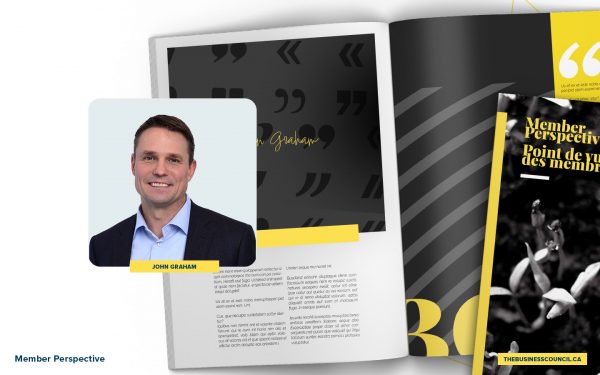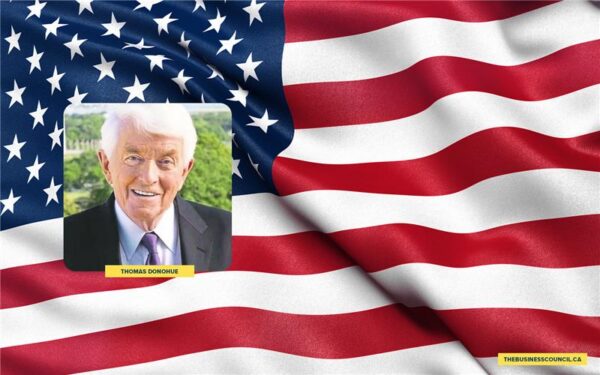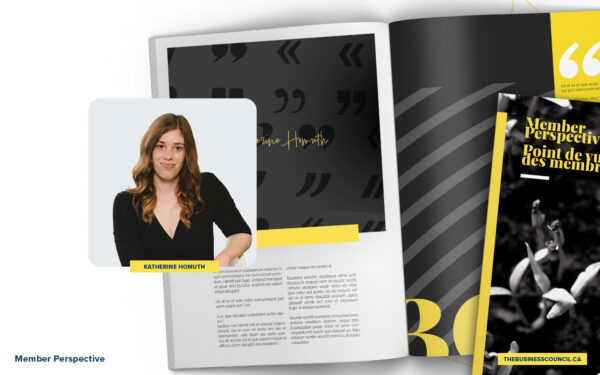I’ve never been more proud of our people
In light of the COVID-19 emergency, we’ve temporarily suspended our regularly scheduled series of conversations with Canadian CEOs. But we’re not going away. Instead, we’re going to pivot to the health emergency itself. We’re going to explore the impact on companies and workers across the country. And we’re going to find out how business leaders are responding to crisis.
Paul Mahon, President and CEO of Great-West Lifeco and Canada Life, discusses the challenges of maintaining an essential service while employees are working from home, how the COVID-19 pandemic is accelerating change to the business model, and how Great-West Lifeco and Canada Life are addressing the mental health of both clients and employees.
Latest Podcasts
Transcript
Goldy Hyder:
Welcome to Speaking of Business. I’m Goldy Hyder of the Business Council of Canada. Over the past few weeks, we have been checking in with business leaders about how the COVID-19 pandemic is affecting them and how they’re responding to this crisis. My guest today has special insight into the impact of the crisis. As President and CEO of Great-West Lifeco and Canada Life, Paul Mahon is focused on the financial, physical and mental health of Canadians. So let’s find out what’s going on out there. Paul, thanks for joining me.
Paul Mahon:
Thank you, Goldy. I’m glad to join you today.
Goldy Hyder:
Well, why don’t we start there? Here you are, a national business. You touch the financial, physical and mental health of Canadians. You’ve got a good line of sight. What are you seeing out there?
Paul Mahon:
We certainly have seen a lot of change over the last six weeks. It all started out with, I would say, a very sharp and acute disruption. It was a disruption, obviously, in people’s lives, as they were told to move to physically distancing and a huge disruption for our economy and obviously we’re a part of that economy, so it was a disruption to our company.
Paul Mahon:
When I think about it, we’re operating at a point in time, six, seven weeks ago, where we had 80% of our 24,000 people around the world working in our offices and fast forward to today and we have 98% of our 24,000 employees around the world working from home. The same thing would go for about a half of our employees here in Canada: 12,000 who 98% are working from home. You think about not just the physical impact there, it’s the mental impact and just how do businesses run and thrive when there’s so much change going on? So that’s really what we’ve observed, this acute change and the need to move quickly.
Goldy Hyder:
Paul, how have your employees been impacted by this pandemic?
Paul Mahon:
Well, interestingly, if you think about our organization, we’re an essential service. We offer wealth management and benefits and things that people are turning to right now from the standpoint of wanting to feel secure and wanting to be able to trust in the institutions they work with. Our employees have in a lot of ways never been busier than they are right now. Our call volumes have spiked up. The need for them to not only go through a relocation, moving their office and all of their ways of working from a workplace to their homes but also to stay on top of that. I’ve never been prouder of our people right across Canada and globally, frankly, because they were able to affect that change, that relocation, I believe, without our customers feeling dislocated. I think our customers, our customer service levels have maintained strong right throughout.
Goldy Hyder:
How much of what you see going on in terms of the changes that are taking place in workplace, do you think are going to be longer lasting than the pandemic? Or do you think it’s just to get us through?
Paul Mahon:
I think that is the key question that we’re focused on right now. A lot of organizations now are turning their attention to this concept of return to the office planning. I think before organizations think about returning to the office, you have to stop and consider what are the things you can learn from this crisis? What are the things you can learn from the actions you’ve taken and what can you learn from your customers? So one of the things that we’ve been very focused on over the last few years is launching new digital services and capabilities, both for our customers but also for our advisors who would work with our customers on a day-to-day basis. A lot of those digital tools and capabilities tend to be adopted slowly over time. People rely on face to face. They rely on what I would say are the old ways of working.
Paul Mahon:
What we’ve seen over the last month is a high rate of adoption. I might argue, we’ve achieved two years of adoption in a matter of weeks, going from maybe 10% usage of some applications to 70% usage. I think a lot of those changes are not going to go back to where they were. We might not maintain full 70% utilization but we might find ourselves with double or even triple the adoption levels that we had pre-crisis. That means that we have to redefine and rethink our business model. We have to rethink, what will people be doing? What will the roles look like? How will they carry out those roles given the fact that there’ll be more things going on digitally. Still, I think a lot of what we’ve seen as an organization, we’re going to take our time, thinking very carefully and clearly about what do we want the business model to look like six months from now, a year from now.
Paul Mahon:
We should really be looking for the good that comes out of this crisis. What are the lessons learned and what are the ways we can make our business model stronger? I think a theme that will run throughout will be leveraging digital capabilities so that we have faster service for clients, lower cost ultimately and also allowing people then to focus more on value add. For insurance advisors it would be spending more time providing advice and less time working on process. I think those are going to be the real positives that come out of this.
Goldy Hyder:
It’s a very consistent theme that I’ve heard in talking to your counterparts, CEOs across the country, that this virus has had the impact of being an accelerator in terms of disruption and in terms of adoption, particularly of digital channels and a digital agenda. It is what it is. We can’t go back and change it. As you look forward, one of the issues that is going to show up, especially as we talk about the need for tracing through this virus period in particular, privacy is, I think, going to emerge as one of these big questions that we’re going to want to talk about as Canadians. So why don’t I ask you because it’s integral to your business: how do you ensure client privacy while employees are working from home? What do you think about the broader issue of privacy and technology as we go forward in terms of tracking and tracing people in terms of whether they care or not?
Paul Mahon:
Two very good questions. I’ll pick the first one first, which is dealing with how do we maintain our clients’ privacy? One of the approaches we took when we looked at our at-home technologies was to make sure they were locked down because one of the challenges of taking a piece of technology, lifting it out of the workplace and taking it home; likely in the workplace you were able to print things, likely in the workplace, you might’ve been able to perhaps use a USB key and a USB port and move it to another piece of equipment. In an at-home work environment, you have to ensure that you’ve locked down your technology such that employees don’t have the capacity or ability to print, to download to other non-corporate systems. So our focus has been ensuring that we put the customer’s privacy first and foremost and if we have to change business process to accommodate that, we do that.
Paul Mahon:
This can be challenging for some employees. So they have to move from having printed paper and one screen to two or three screens to be able to effectively do their job in that environment. But we believe it’s so fundamental and critical to maintain that privacy in a work at home environment. So I think technology can be your friend there but you really have to have the discipline to put that in place and then you also have to have strong monitoring. So, not withstanding all of that, you have to have constant monitoring of that. More importantly, you actually have to explain why to your employees and get them buying into it. Now, as part of our ongoing compliance, we have annual compliance training related to privacy. So this is nothing new for our employees but it’s new for them to now be able to do this work in a home environment where you don’t have that same security.
Paul Mahon:
I think we’ve got that well in hand. To the second question, I think the issue of this testing, tracking and tracing, I think it’s going to feature in those economies or those jurisdictions that probably do the best as they come out of this crisis and once having flattened the curve, how do you actually sustain that over a long period of time and not have a bounce back or a spike again. You do see jurisdictions around the world that are adopting technologies related to that. There’s a real question there, there’s a trade-off between what are my rights to privacy versus what are my responsibilities as a citizen?
Paul Mahon:
I think this is going to be one of the toughest challenges that governments, institutions and individuals face. Where do you put an individual’s rights in the context of the health of a population of a city or the jurisdiction? I don’t have a great answer for that, other than to say that if I had my choice, and this is a personal statement, if I had my choice, I would rather give up a little bit of privacy for the good of the community in the context of us being able to manage through this. That’s a personal comment. That’s not a comment on behalf of the corporation in any way.
Goldy Hyder:
Well, Paul, thank you for sharing those personal views on this podcast. We appreciate it. Now, one issue that we are very focused on at the Business Council is workplace mental health. It’s an issue that was important to us long before this virus but it’s even more acutely so now. One of the things about working from home, of course, is it can present its own challenges. It can be isolating. It can be demanding. It can, frankly, be frustrating. What concerns do you have around what a working from home model can mean for mental health?
Paul Mahon:
Two comments I’ll make. The first is we’ve been very active on mental health in the workplace. We have the Canada Life Centre for Mental Health in the Workplace which provides tools and resources and support to companies in terms of being able to manage that. But to a large extent, that was what we contemplated in a lot of those tools and resources, was an in the workplace work environment and that home work environment creates some additional challenges. I think one of the biggest challenges is the separation of work and life. One of the things that our people are noting is that, when you don’t have a physical separation between your office and your home, it’s hard to turn it on and turn it off. We’re trying to use lots of guidance and support for our employees and education that they’ve got to find that balance. They’ve got to find ways to create separation between their workday and their home life. So I think that’s a very critical feature to this.
Paul Mahon:
In the context of the benefits we provide to companies. I think what has featured more and more in terms of, sort of the best benefit plans, would be increasing coverage for psychological counselling and all the other types of services that would support an individual. Number one, this is featuring more and more in the benefits coverage that we would provide. But I think it will become more acute as time passes as we deal with periods of uncertainty like this right now. As we consider our own employee population, we’re thinking about a return to work scenario where roles will be more centred at home, as opposed to coming back into the workplace. We’ll still be thinking about ways to engage those individuals, either digitally using things like Zoom or Teams, but also bringing those individuals back into the workplace on a regular basis for collaboration, for training and frankly for camaraderie.
Paul Mahon:
I think people will need a connectedness there. I think the other reality is it won’t be one-size-fits-all for all roles. So, for context, if we concluded that a lot of our call centres could work very effectively with the staff and individuals in their homes, that might not be the best business model for everyone. Some individuals might not be able to manage that. I think we’re going to have to think about flexibility in our work offering for people such that those who can thrive in an at-home work environment could work there. Those who could thrive more in an in-office work environment could work there and look for providing that balance and that opportunity because everyone is wired a little bit differently. I think we have to have that level of flexibility in our workforce and our work site planning as we think about the future.
Goldy Hyder:
Well, Paul you’ve given our listeners a lot to think about. I really appreciate you joining us and making time in your busy schedule to be here.
Paul Mahon:
Well, thank you, Goldy. It’s a pleasure to connect with you and the work you’re doing, obviously for Canada, but in the context of these podcasts, I think is excellent. It gives people insight and ideas in terms of sharing best practices. So hats off and we appreciate the work you’re doing.
Goldy Hyder:
Well, thank you. As that hashtag goes, we are all in this together. As I say, it’s not just a hashtag, it’s an actual strategy and then let’s hope it’s working.
Paul Mahon:
Thank you.
Goldy Hyder:
Paul Mahon is President and CEO of Great-West Lifeco and Canada Life. We’ve heard a wide range of voices and perspectives on this podcast, and I encourage you to listen to more of our conversations at SpeakingOfBiz.ca or wherever you get your podcasts. Until next time, I’m Goldy Hyder. Thanks for joining us. Be well.
